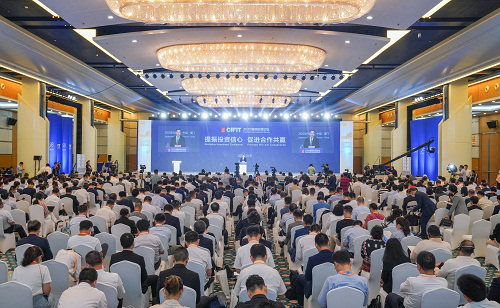Economies to change in wake of pandemic
From:China Daily Date:2020-09-11【Font:large regular】
In the context of the COVID-19 outbreak, the world economy is facing new challenges and opportunities, officials and business insiders said on Tuesday at a forum during the ongoing China International Fair for Investment and Trade in Xiamen.
As a highlight of the annual CIFIT, the International Investment Forum attracted business insiders from around the world to share insights on global investment and economic trends.
Zhao Long, vice-governor of Fujian province, said the progress in science and technology has facilitated the development of international cooperation.
"Countries are interdependent in terms of the economy and there is no country that can develop its economy alone," Zhao said.
"Opening-up with an inclusive mind and conducting win-win cooperation are key principles in solving difficulties," he said.
In the trend of global cooperation, people with long-term vision can seize opportunities in a crisis, he added.
Wang Xiangming, chairman of China Resources Group, said global trade cooperation is embarking on a new pattern.
Since the global financial crisis in 2008, the pace of globalization has moved from expansion to contraction, he said.
Currently, traditional trade faces challenges and the global environment is also changing due to the impact of the COVID-19 pandemic, he added.
"Our country has set out the goal of fostering a new, dual-cycle development pattern with the domestic cycle as the mainstay and with domestic and international development reinforcing each other," Wang said.
Such a development pattern draws from the strengths of China's large-sized market and expanding opening-up, he said.
Accelerating Chinese manufacturing based on technology and new market demand is conducive to opening a new global trade map and profoundly influencing enterprises at home and abroad, Wang said.
Li Yong, director-general of the United Nations Industrial Development Organization, said the COVID-19 pandemic has created not only a significant impact on society but also at the global economic level.
The COVID-19 pandemic affected the industrial manufacturing sector in many essential global value chains, Li said.
According to the United Nations Conference on Trade and Development, the contraction of the global foreign direct investment flow would reach 40 percent during 2020-21.
That sharp contraction will be expected in industries such as airlines, hotels and restaurants, Li said.
"While there are many losers in the crisis, there are also some winners," Li said.
The digital economy has been positively affected with exponential profits being registered in the information technology, computer, software, media and e-commerce sectors, he noted.
"At the global level, digitization will prompt multinational enterprises to rethink the comparative advantage of an abundant low-skill labor, which will gradually vanish," he said.

A speaker shares his insights with participants at the International Investment Forum.



